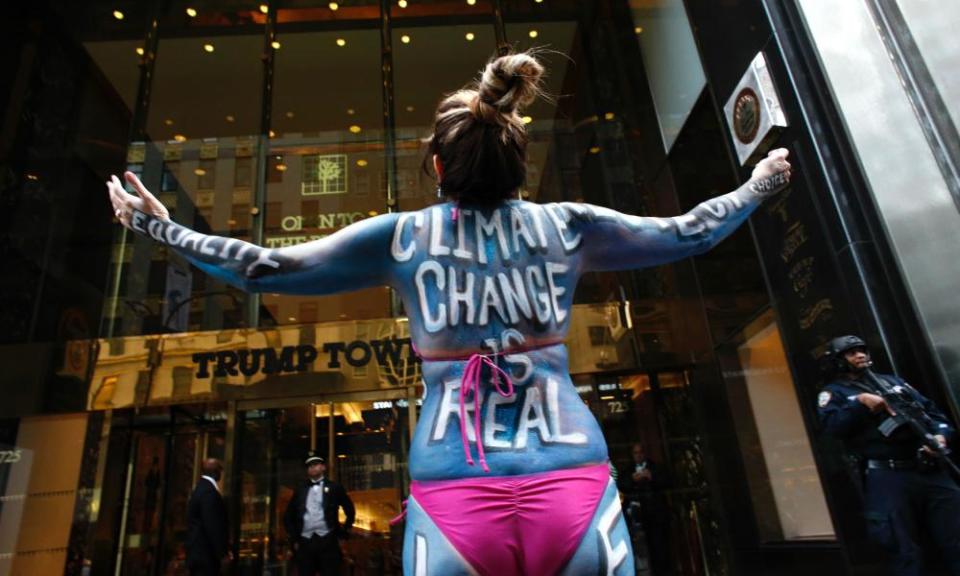Climate deniers want to protect the status quo that made them rich

From my vantage point outside the glass doors, the sea of grey hair and balding pates had the appearance of a golf society event or an active retirement group. Instead, it was the inaugural meeting of Ireland’s first climate denial group, the self-styled Irish Climate Science Forum (ICSF) in Dublin in May. All media were barred from attending.
Its guest speaker was the retired physicist and noted US climate contrarian, Richard Lindzen. His jeremiad against the “narrative of hysteria” on climate change was lapped up by an audience largely composed of male engineers and meteorologists – mostly retired. This demographic profile of attendees at climate denier meetings has been replicated in London, Washington and elsewhere.
How many people in the room had children or indeed grandchildren, I wondered. Could an audience of experienced, intelligent people really be this blithely indifferent to the devastating impacts that unmitigated climate change will wreak on the world their progeny must inhabit? These same ageing contrarians doubtless insure their homes, put on their seatbelts, check smoke alarms and fret about cholesterol levels.
Why then, when it comes to assessing the greatest threat the world has ever faced and when presented with the most overwhelming scientific consensus on any issue in the modern era, does this caution desert them? Are they prepared quite literally to bet their children’s lives on the faux optimism being peddled by contrarians?
“We have been repeatedly asked: ‘Don’t you want to leave a better Earth for your grandchildren,’” quipped the comedian and talk show host John Oliver. “And we’ve all collectively responded: ‘Ah, fuck ’em!’” This would be a lot funnier were it not so close to the bone.
Short-termism and self-interest is part of the answer. A 2012 study in Nature Climate Change presented evidence of “how remarkably well-equipped ordinary individuals are to discern which stances towards scientific information secure their personal interests”.
This is surely only half the explanation. A 2007 study by Kahan et al on risk perception identified “atypically high levels of technological and environmental risk acceptance among white males”. An earlier paper teased out a similar point: “Perhaps white males see less risk in the world because they create, manage, control and benefit from so much of it.” Others, who have not enjoyed such an armchair ride in life, report far higher levels of risk aversion.
Another 2011 paper observed uncontroversially that “conservative white males are likely to favour protection of the current industrial capitalist order which has historically served them well”. It added that “heightened emotional and psychic investment in defending in-group claims may translate into misperceived understanding about problems like climate change that threaten the continued order of the system.”
A paper earlier this year from Vanderbilt University pinpointed what motivates many who choose to reject climate change: not science denial, but “regulation phobia”. Most deniers accept science in general, and even pride themselves on their science literacy, however, combatting climate change means more regulations and, the paper says, “demands a transformation of internalised attitudes”. This, the authors conclude, “has produced what can fairly be described as a phobic reaction among many people”.
Facing up to climate change also means confronting the uncomfortable reality that the growth-based economic and political models on which we depend may be built on sand. In some, especially the “winners” in the current economic system, this realisation can trigger an angry backlash.
This at last began to make sense of these elderly engineers crowding into hotel rooms to engage in the pleasant and no doubt emotionally rewarding group delusion of imagining climate change to be some vast liberal hoax.
In truth, the arguments hawked around by elderly white male climate deniers like Fred Singer, William Happer and Nigel Lawson among others are intellectually threadbare, pockmarked with contradictions and offer little more than a cherry-picked parody of how science actually operates. Yet this is catnip for those who choose to be deceived.
It is, however, deeply unfair to tar all elderly white men as reckless and egotistical; notable exceptions include the celebrated naturalist David Attenborough and the former Nasa chief Jim Hansen. But their voices are often lost in the fog of denial.
A century after elderly military leaders cheerfully sent millions of young men from the trenches to their slaughter in the first world war, the defiant mood of today’s climate deniers is best captured by the stirring words of Blackadder’s General Melchett: “If nothing else works, a total pig-headed unwillingness to look facts in the face will see us through!”

 Yahoo News
Yahoo News 